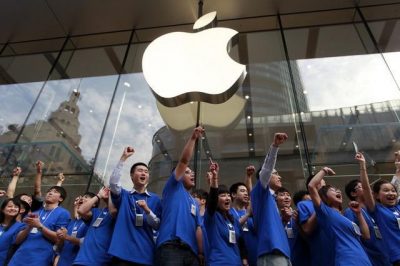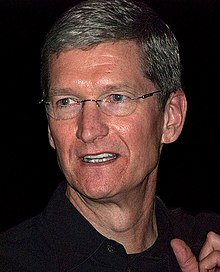Apple’s China Surrender

“This is very dangerous precedent which can lead to same moves in countries like UAE etc. where government control access to internet.” Star VPN, Twitter, Jul 30, 2017
Caving in for the profit margin; stripping a function for the sake of the state rather than the customer. That’s the Apple approach, nudged along by political expediency and the heckling of the police state. In China, the company has pruned back its virtual private networks. It would have delighted the party hacks in Beijing, suspicious of any effort to subvert the censorship regime which has come to be called the Great Firewall.
As Emily Parker dourly notes,
“Doing business in China requires playing by Chinese rules, and American tech companies have a long history of complying with Chinese censorship.”[1]
Apple has just been more enthusiastic than their counterparts. Earlier this year, it went as far as to remove New York Times apps from its Chinese store. How good of them to do so.

Tim Cook (Source: Wikimedia Commons)
The words from Apple’s CEO, Tim Cook, have been discouraging for the technology battlers and those keen to run rings around authoritarian regimes. Cook, in fact, would rather get into bed with them.
“We would obviously rather not remove the apps,” he explained earlier in the week. “But like we do in other countries, we follow the law wherever we do business.”[2]
The law, it would seem, good or bad.
As for the Chinese Communist Party, action on VPN technology has been placed at the top of the agenda ahead of the party congress. Operating such services now verges between inconvenience and hazard, given that authorities must approve them.
Such actions on the part of Apple further dispel the idea that accessing the Internet remains a sacred right and, it can be said, rite of passage into the digital age. The United Nations went so far as to declare it as such last year, highlighting the importance of “applying a comprehensive human rights-based approach when providing and expanding access to the internet for the internet to be open, accessible and nurtured.”
Countries may well be happy to front a view that accords with this, but states are far from happy permitting their public untrammelled use. Bollards are needed; security measures required. A free using public, in short, cannot be trusted by what it can find.
To the relief of such states, Cook is happy to comply. As, in fact, are other companies wishing to sacrifice the liberties of their users for their profit margins. Notoriously, Google bowed to the wishes of Chinese authorities in 2006 to censor search results, conduct which naturally gave the VPN drive a boost.
In 2005, by way of a dire utilitarian example, Yahoo furnished Chinese authorities with information on a journalist, Shi Tao, that led to a 10 year prison sentence.[3] The sin there was sending an anonymous post to a website located in the US that contained, so it was claimed, state secrets.
In what was something of a dark year, Microsoft similarly got into line in censoring its Chinese-language wed portal. Business, after all, was business, and the tech giant wasn’t going to miss out on a vast market. As global sales and marketing director at the time, Adam Sohn, explained, the company was cooperating with its Chinese business partner to police inappropriate language.
When queried about what this entailed, Sohn ducked.
“I don’t have access to the list at this point so I can’t really comment specifically on what’s there.”[4]
A clue about the list came in a report from Agence France-Presse claiming that bloggers were not permitted to post such terms as “human rights” or “democracy” on MSN spaces.
Sohn’s Mephistophelian explanation was simple. The company could still do business in China, despite the shackles, while helping the very populace they were complicit in hoodwinking. It all came down to how the services were used. “Even with the filters, we’re helping millions of people communicate, share stories, share photographs and build relationships. For us, that is the key point here.” Be safe, innocuous, non-political and insipid.
In 2006, the major giants doing business in the rich pearl of Cathay faced the music in a Congressional hearing. As California Democrat and house representative Tom Lantos claimed at the time, directing his comments to Yahoo, Google, Microsoft and Cisco,
“I do not understand how your corporate leadership sleeps at night.”[5]
What such conduct betrays, sleepless or otherwise, is that standards of resistance from these companies varies. Apple has been clamouring against efforts made in the US to unlock its iPhone technology. The FBI faced a defiant response when its order to access the phone of the San Bernardino shooter was frustrated. It is worth noting, as matter or proportion, that the shooter was behind the slaying of 14 people.
Cook would have none of this, seeing any comparisons as needlessly fatuous.
“In the US case, the law in the US supported us.”
Rather weakly, he suggested that the company had “to abide by [the law] in both cases. That doesn’t mean we don’t state our point of view in the appropriate way, we always do that.” Well, not always, and certainly not when it is inappropriate to sales. Dissidents, be wary.
Dr. Binoy Kampmark was a Commonwealth Scholar at Selwyn College, Cambridge. He lectures at RMIT University, Melbourne. Email: [email protected]
Notes

